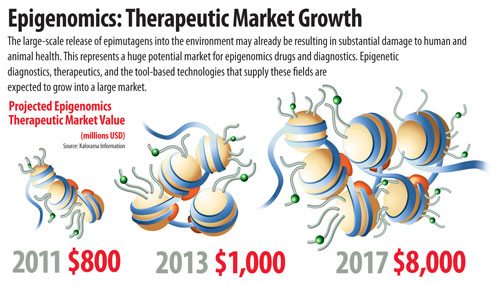October 15, 2012 (Vol. 32, No. 18)
K. John John Morrow Jr. Ph.D. President Newport Biotech
Market Expected to Offer Significant Opportunities and Grow to $8B in Six Years
As is often the case in the history of science, observations that do not agree with the dominant paradigm are swept under the rug until they build up to the point where they can no longer be ignored.
So was the case with epigenomics. Written off as a branch of genetics mainly relevant to gene imprinting, in recent years it has assumed a major role in cancer diagnosis and treatment.
Epigenetic mechanisms are flexible genomic parameters that can change gene expression under external influences while propagating these modifications from one generation to the next. There are three major chemical alterations that fill the epigenetic toolbox: (1) DNA methylation, (2) histone modification, and (3) microRNA modification. These mechanisms can affect regulator genes, controlling the expression of diverse structural genes and guiding embryonic differentiation, including many sensitive developmental processes like the nervous system.
Until recently, epigenomics was considered to have limited impact on clinical conditions, and by this token would not merit consideration from the pharma industry. Indeed epigenetic disorders were considered rare, and of quite limited significance to the treatment of disease.
Within the last few years, all this has changed. There exists a class of chemical agents that affect these epigenes, and these are referred to as “epimutagens.”
Many of these agents have important industrial applications and have become widespread through the environment, especially in the last decade. The exploitation of these findings will open up a large area of R&D in disease diagnostics and drug discovery that is already under way. Kalorama believes that the impact of epigenomic discoveries on the pharma industry will be substantially greater than is currently predicted.
There are two critical issues that represent potential opportunities for the biotech industry: (1) large-scale release of epimutagens into the environment, which may already be resulting in substantial damage to human and animal health; and (2) a huge market for potential epigenomic drugs and diagnostics. These present tremendous opportunities for companies at all levels: epigenetic diagnostic companies, therapeutic companies, and companies that focus on tool-based technologies that supply the industry.
Predictions for growth within the epigenomics sector by analysts are aggressively optimistic. Our own model is that an epigenomic drug market of $800 million could grow to $8 billion in six years. A severe and prolonged downturn in the world economy, as well as unforeseen and drastic setbacks in clinical trials, are negative risk factors, but a promising pipeline and the progress to date in epigenetic technologies leads to Kalorama’s estimate.
Kalorama predicts that the major part of this growth in the next five years will occur in the oncology sector. This conclusion reflects the demand of cancerous conditions and the absence in so many instances of effective therapies. Furthermore, thorough epigenetic-based disease models have yet to be developed for neurological-, immunological-, and cardiology-based conditions.
At present the major pharma companies are faced with a downward spiral of profitability. Epigenetic technologies represent an escape from this corrosive cycle of greater and greater expenditures and poorer and poorer yields.
Kalorama believes that the gravity of the challenge and the risk from inaction are serious issues that must be addressed by a concerted effort. Such action must represent a partnership between the commercial and academic research institutions, including universities, the federal government, and private foundations. Many of the major pharma/biotech players are already pursuing vigorous and imaginative epigenomics programs, so any new entrants into the field must therefore proceed with upmost alacrity.

Epigenomics: Therapeutic Market Growth
K. John Morrow Jr., Ph.D. ([email protected]), is the author of Epigenomics: Future Applications in Therapeutics and Diagnostics by Kalorama Information.







